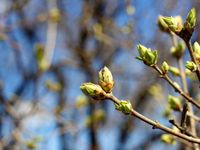The arrival of spring is upon us, heralding a transition that many have eagerly awaited after months of winter. In 2025, the astronomical spring commences on March 20 at 04:06 Polish time, marking a time of increasing daylight as the sun shifts across the equator. This natural phenomenon signals the end of short days, paving the way for longer, warmer days ahead.
Interestingly, alongside the astronomical start, calendar spring will officially kick off on March 21, 2025. This fixed date has remained unchanged through the years, representing a moment celebrated widely, especially among students planning their annual spring excursions. The notion of the first day of spring invites not just joy for the warmth it promises, but also raises questions about the weather ahead.
The Institute of Meteorology and Water Management observes, "This year's arrival of spring will be stormy, with cold temperatures and snowfall at the beginning of the week of the calendar winter and spring transition." As we move into this promising season, the weather in Poland is expected to be tumultuous, stirring concerns among farmers about potential impacts on their crops.
Current meteorological predictions indicate that the region will experience fluctuations in temperature. Cold mornings and periodic ground frosts are likely throughout the early weeks, streamlining potential threats to young crops. Farmers express increasing concern over soil moisture levels, which have seen a significant decline due to the lack of winter precipitation, resulting in conditions that may hinder crop development.
Specific areas have recorded low levels in rivers and reservoirs, with some reported to be at their lowest in a decade. These conditions may lead to a heightened risk of hydrological drought and water supply issues later in the growing season.
Furthermore, as meteorologists elaborate on weather patterns, April and May are expected to introduce even more volatility. "The weather will improve, and high pressure will provide plenty of sunshine, so after frosty nights, the day will be quite pleasant," noted the Institute. However, brief yet intense rain showers cannot be ruled out, potentially washing away the soil's residual moisture.
Moreover, with the soil already challenged by moisture deficits, experts warn of the heightened risk of fire in forested areas. The combination of low precipitation and rising temperatures later in spring could lead to an increase in forest and field fires, presenting another challenge for local ecosystems.
As spring progresses, prevailing weather trends suggest that variations will not only influence temperatures but also the beauty of the landscape. The rain is anticipated to maintain its dominance at the start of April, with forecasts hinting at a cooler snap between April 11 and 13, where nighttime frosts could threaten crop viability for those already germinating.
By the time we transition into the latter part of April, forecasts indicate temperatures could climb to a comfortable 20 degrees Celsius, creating a stark contrast to the early month chill. Farmers must stay vigilant, for this change could substantiate opportunities for crop recovery, yet simultaneously fuel the fire risk as drier days may follow.
The challenges posed by this spring herald a meaningful time for Poland as the seasons shift. While the promise of warmer days and blooming flora is inviting, the realities of climate fluctuations serve as a reminder for both farmers and policymakers. Emphasizing the biodiversity and productivity of agriculture during this potential crisis could determine the successful outcome of the season.
In conclusion, as we eagerly step into spring, it offers not only rejuvenation but also diverse challenges. The anticipation of longer days and sunsets invites a range of human emotions and ripple effects throughout the region's economy, especially concerning agriculture. Only time will reveal how farmers will adapt to these fluctuations, governing both survival and innovation for future seasons.

![Pierwszy dzień wiosny 2025: Kiedy astronomiczna wiosna i wiosna kalendarzowa? Długoterminowa pogoda na wiosnę i lato 2025 [21.03.2025]](https://thumbor.evrimagaci.org/t3UQVx-P2xAyzq1Y7N5ZuWVBnRA=/200x0/tpg%2Fsources%2F26193959-3016-41ee-b3b0-32cc5c6bab8d.jpeg)
![Kartki na pierwszy dzień wiosny 2025 z życzeniami. Pobierz bezpłatną grafikę i wyślij swoim znajomym [21.03.2025]](https://thumbor.evrimagaci.org/5bDNRlSp-7V_TyWDqyyiuU81iYQ=/200x0/tpg%2Fsources%2Fe6ccc6cd-4f9d-446e-8a69-360bb7e57b3e.jpeg)





